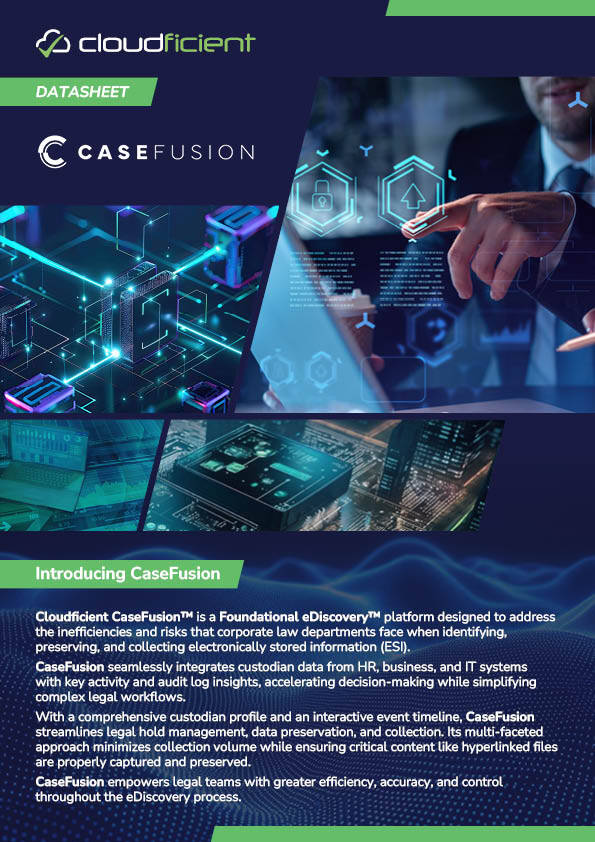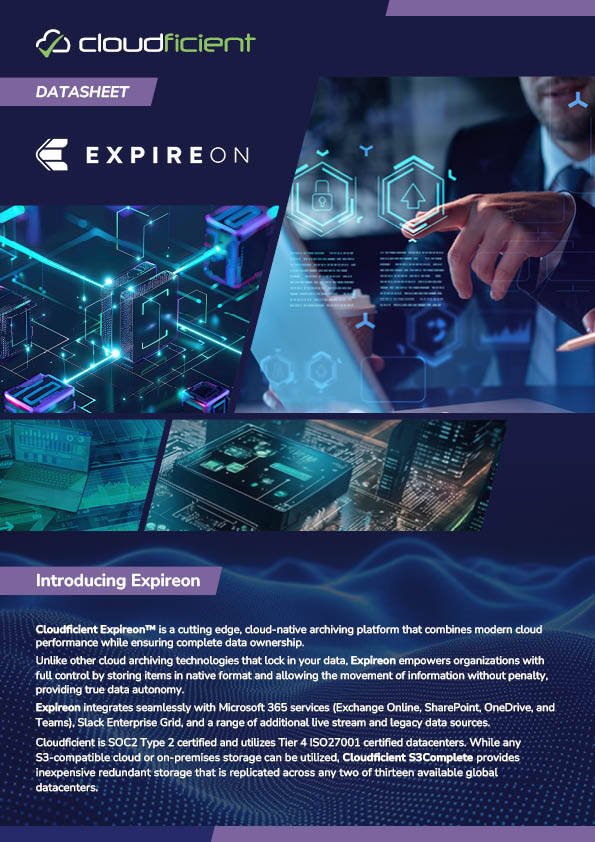- Solutions
- Foundational eDiscovery
- Microsoft Purview Considerations
Rethink eDiscovery Beyond
Microsoft Purview
Tired of slow searches, incomplete indexing, or unreliable legal holds in Microsoft Purview? It’s time to reduce risk, lower cost, and improve compliance with solutions designed for modern discovery.
Limited EDRM Alignment
Microsoft Purview eDiscovery does not fully support the end-to-end Electronic Discovery Reference Model (EDRM), with key deficiencies in early-stage data identification and post-review integration. As a result, the platform struggles to function as a holistic eDiscovery solution and often requires supplementation with third-party tools.
Potential Gaps include:
-
Weak information governance, identification, and early case assessment (ECA) capabilities limit the integration between analysis, review, and production stages.
-
Inefficient data culling leads organizations to over-collect data, inflating review volumes with large data sets that could be reduced by 60-80% with better upfront filtering.
-
Limited integration and minimal automation across EDRM stages hinders the handoff to downstream review platforms, leading to increased manual effort and workflow disruption.
-
Incomplete lifecycle coverage reduces platform utility for organizations seeking unified discovery environments.
.webp?width=1456&height=720&name=freepik__the-style-is-3d-model-with-octane-render-volumetri__37983%20(1).webp)

Search Performance and Usability Limitations
Microsoft Purview eDiscovery continues to face significant limitations in both search performance and user accessibility. Long search times, indexing delays, and reliance on complex query syntax hinder timely investigations.
Common limitations include:
-
Searches across large datasets can take minutes or longer to return results, delaying time-sensitive investigations. Indexing speed may also be throttled, slowing the availability of newly ingested content for review, forcing teams to cast wider nets and inflate review volumes.
-
KQL-based search syntax requires technical fluency, creating barriers for legal and compliance users.
-
No native support for natural language search or AI-assisted query building on standard plans.
-
Bottlenecks in query execution and data readiness increase legal risk and create overly-broad collections that dramatically increase downstream review costs.
Requires E5 License for Advanced Features
Access to Microsoft Purview’s advanced eDiscovery features remains gated by high-tier licensing, though Microsoft has announced modular licensing changes taking effect in August 2025. While some capabilities previously exclusive to the Microsoft E5 license may become available via à la carte or usage-based models, significant cost and complexity barriers persist.
Potential impacts could include:
-
Features such as advanced eDiscovery, custodian management, and analytics continue to require E5 or E5 Compliance add-ons, with limited relief from new modular options.
-
Legal hold and case management capabilities are limited or unavailable for users on E3 or Business plans.
-
Modular pricing introduces new billing complexity and variability. Even large enterprises may struggle with fully adopting capabilities due to uncertain consumption pricing and administrative overhead.
-
IT and legal teams must navigate a fragmented licensing model that can delay deployment and inflate operational overhead.


Limited File Type Support with Microsoft Purview eDiscovery
Microsoft Purview eDiscovery offers support for only 64 file types, the majority of which are Microsoft-native formats. This narrow compatibility significantly restricts its effectiveness in environments with diverse data sources and specialized formats, forcing organizations to rely on external tools for file conversion and normalization.
Compatibility issues may include:
-
Limited support for industry-specific, multimedia, and proprietary file formats (e.g., CAD, audio/video, engineering files).
-
Files from third-party platforms often require manual preprocessing or conversion before ingestion.
-
Incompatibility with modern data types (e.g., Slack JSON, social media exports, proprietary software files) complicates data collection.
-
Dependence on external tools adds cost, delays, and risk to the eDiscovery workflow.
-
Reduced accuracy and completeness of datasets can undermine defensibility in legal and regulatory contexts.
Audit Trail & Defensibility Risks
Microsoft has outlined improvements to audit logging and export integrity as part of the August 2025 roadmap. However, these benefits may only be accessible under higher compliance SKUs or add-on modules, leaving gaps for organizations without premium access.
Key challenges include:
-
Audit logs may be incomplete, inconsistently recorded, or lack sufficient detail for defensibility without upgraded compliance features.
-
Metadata inconsistencies in exports can challenge authenticity and admissibility in court.
-
Actions like redactions or custodial searches are not always clearly logged or reproducible. Key review actions (e.g., redactions, tagging, custodial searches) may still lack complete traceability in exports under base plans.
-
Weak evidence handling increases risk under frameworks like GDPR, CCPA, HIPAA, and SEC regulations.
-
Legal defensibility of productions is inconsistently supported across licensing levels.

Implement Efficient Data Management Practices
Establishing consistent retention and disposal policies helps manage data growth while reducing risk. Mapping data across repositories and classifying it by relevance and ownership improves visibility and accelerates legal response when needed.
Smart Indexing
Timely and thorough indexing ensures critical content isn’t missed during discovery. Indexing should scale to include structured, unstructured, legacy, and archived data. Targeted indexing reduces unnecessary overhead while maintaining defensibility and compliance.
Automate Early Data Assessment
Manual data review slows response times and increases cost. Automating early case assessment enables fast identification of key custodians, estimated data volumes, and high-relevance materials before full-scale processing. This approach reduces scope by up to 80% and can save thousands in review costs per matter.
Categorize & Cull with AI
Eliminating irrelevant content early helps streamline legal review and reduce risk. AI-driven categorization tools can identify privileged or sensitive data and separate low-value materials. Adaptive machine learning models can reduce data volumes significantly to lower review costs while increasing accuracy.
Reduce Tool & Licensing Bloat
Overlapping tools and restrictive licenses drive up costs and create inefficiencies. Consolidating eDiscovery workflows with modular, scalable solutions reduces redundancy. Choosing tools with flexible licensing and integration options ensures both functionality and budget alignment.
Optimize Search Queries
Precision in search strategy leads to faster and more accurate eDiscovery results. Well-constructed queries using filters, logical operators, and scopes tailored to custodians or date ranges improve search outcomes. Reusable templates and iterative testing further optimize workflows.
Validate and Defend Every Export
Errors in data production can undermine legal outcomes and regulatory compliance. A defensible export process verifies completeness, preserves metadata, and maintains formatting integrity. Automating this validation minimizes human error and supports chain-of-custody standards.
Our Solutions
Cloudficient delivers modern eDiscovery and compliance solutions that go beyond the limitations of Microsoft Purview. Our platform is built to integrate seamlessly with Microsoft 365, scale with your organization’s data needs, and prioritize security and regulatory compliance while helping you reduce operational and licensing costs.
CaseFusion - CaseFusion is a modular product suite designed to revolutionize the efficiency of legal departments by delivering process improvements in early data assessment within eDiscovery. It assists legal departments in answering critical questions (who, what, where) about custodians and data sources, enhancing eDiscovery processes while dramatically reducing data volumes sent for expensive downstream review.
Hyperlize - Hyperlize is an innovative platform designed to revolutionize eDiscovery data validation. It enables legal professionals to identify missing hyperlinked documents and validate load file integrity with unprecedented efficiency, ensuring compliance with eDiscovery best practices.
Expireon - Expireon offers a cloud-based archiving platform that assists enterprise organizations in managing data during and after transformation projects. It provides rapid onboarding, efficient targeted indexing, RSMF export, and tailored eDiscovery capabilities that reduce downstream data by about 40% without vendor lock-in.
Expireon AI Studio - Expireon AI Studio utilizes advanced AI capabilities to categorize email data at high volumes, separating low-value emails from relevant and sensitive or privileged emails. This reduces review volume by 40% and achieves over 90% accuracy initially (with further improvements over time) to save thousands of dollars per case.
Together, these solutions ensure reliable compliance while reducing risk, accelerating insight, and simplifying complexity across your organization’s eDiscovery and data governance processes.
Frequently Asked Questions
What is Microsoft Purview?
Microsoft Purview is Microsoft’s compliance and data governance platform, offering tools for data classification, legal holds, search, and export within Microsoft 365. While it supports basic eDiscovery functions, it often falls short for legal teams handling complex, high-volume matters. Limitations in search speed, audit trails, and file type support mean many organizations need to supplement Purview with more advanced, purpose-built eDiscovery solutions.
Why is traditional eDiscovery no longer enough for today’s regulatory and litigation environments?
Data sources have diversified, case timelines have tightened, and regulatory scrutiny has intensified. Traditional tools can’t keep pace with the speed, scale, and complexity of modern legal demands. Irrelevant data can cost organizations thousands of dollars per matter.
How do we validate AI outcomes in legal settings?
Explainability is key. Tools must provide traceability into how AI classified documents, as well as opportunities for human oversight. These are essential for defensibility and regulatory transparency.
What’s driving the shift away from Microsoft Purview for discovery-heavy organizations?
Legal departments need tools that move as fast as the risk. Purview’s rigid licensing, slow indexing, and limited analytics create drag in environments where time-to-insight and defensibility matter most.
-3.png?width=250&height=33&name=Untitled%20design%20(18)-3.png)
-3.png?width=527&height=69&name=Untitled%20design%20(18)-3.png)
.png?width=600&height=79&name=Untitled%20design%20(18).png)





